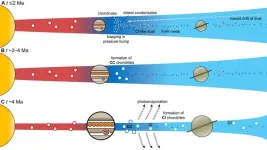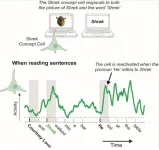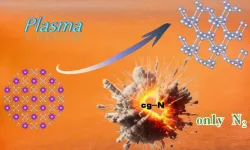(Press-News.org) Researchers with McMaster University have discovered that the protein mutated in patients with Huntington’s Disease doesn't repair DNA as intended, impacting the ability of brain cells to heal themselves.
The research, published in PNAS on Sept. 27, 2024, found that the huntingtin protein helps create special molecules that are important for fixing DNA damage. These molecules, known as Poly [ADP-ribose] (PAR), gather around damaged DNA and, like a net, pull in all the factors needed for the repair process.
In people with Huntington’s Disease, however, the research found that the mutated version of this protein doesn’t function properly and isn’t capable of stimulating PAR production, ultimately resulting in less effective DNA repair. The study builds off a discovery researchers with McMaster’s Truant Lab published in 2018, which first detailed the huntingtin protein’s involvement in DNA repair.
“We looked at the PAR levels in the spinal fluid from Huntington’s Disease patients and expected it would be higher due to the higher levels of DNA damage, but we actually found the opposite,” says lead author and McMaster research associate Tamara Maiuri. “The levels were quite a bit lower and not only in Huntington’s Disease samples, but also in people who carry the gene but aren't yet showing outward symptoms.”
This was an unexpected discovery because researchers have previously found PAR levels to be elevated in patients with other neurodegenerative disorders like Parkinson’s and Amyotrophic lateral sclerosis (ALS).
Huntington’s Disease is a genetic disorder that affects the brain and causes the gradual deterioration of nerve cells. For children of parents who have Huntington’s Disease, there’s a 50 per cent chance they will inherit the gene.
Future study on Huntington’s and cancer research
This discovery has a unique connection with cancer research. Ray Truant, senior author of the study and professor with McMaster’s Department of Biochemistry and Biomedical Sciences, says there are drugs that stop PAR production called PARP inhibitors that are used as cancer treatments.
Truant says this may explain a long-standing observation that carriers of the Huntington’s Disease gene have significantly lower rates of cancer and may confer an evolutionary advantage in the human population, by avoiding early life cancer.
“One implication is that new huntingtin-level lowering drugs already in clinical trials may have utility outside of Huntington’s Disease to cancer. Based off the findings in this paper, we are working in collaboration with Sheila Singh’s lab at McMaster University's Centre for Discovery in Cancer Research to investigate the potential further,” Truant says.
Researchers say future studies should look at different classes of FDA-approved PARP1 inhibitor drugs as they may hold promise not just for Huntington’s Disease but neurodegenerative diseases at large.
Researchers with University College London, Johns Hopkins University and the University of Toronto assisted with this study. The new McMaster Center for Advanced Light Microscopy was also utilized to image the huntingtin protein with PAR chains, giving researchers a closer look at how these molecules interact. This was done with the assistance of McMaster’s Andres Lab.
This research was supported by the Canadian Institutes of Health Research Project Grant and the Krembil Foundation, the Huntington Disease Society of America Berman Topper Career Development Fellowship and HD Human Biology Project.
END
McMaster researchers discover what hinders DNA repair in patients with Huntington’s Disease
2024-09-27
ELSE PRESS RELEASES FROM THIS DATE:
Estrogens play a hidden role in cancers, inhibiting a key immune cell
2024-09-27
DURHAM, N.C. – Estrogens are known to drive tumor growth in breast cancer cells that carry its receptors, but a new study by Duke Cancer Institute researchers unexpectedly finds that estrogens play a role in fueling the growth of breast cancers without the receptors, as well as numerous other cancers.
Appearing Sept. 27 in the journal Science Advances, the researchers describe how estrogens not only decrease the ability of the immune system to attack tumors, but also reduce the effectiveness of immunotherapies that are used to treat many cancers, notably triple-negative breast cancers. Triple-negative ...
A new birthplace for asteroid Ryugu
2024-09-27
In December 2020 the space probe Hayabusa 2 brought samples of asteroid Ryugu back to Earth. Since then, the few grams of material have been through quite a lot. After initial examinations in Japan, some of the tiny, jet-black grains traveled to research facilities around the world. There they were measured, weighed, chemically analyzed and exposed to infrared, X-ray and synchroton radiation, among other things. At the MPS, researchers examine the ratios of certain metal isotopes in the samples, as in the current study. Scientists refer to isotopes as variants of the same element that differ only in the number of neutrons in the nucleus. Investigations ...
How are pronouns processed in the memory-region of our brain?
2024-09-27
A new study shows how individual brain cells in the hippocampus respond to pronouns. “This may help us unravel how we remember what we read.”
Read the following sentence: “Donald Trump and Kamala Harris walked into the bar, she sat down at a table.” We all immediately know that it was Kamala who sat at the table, not Donald. Pronouns like “she” help us to understand language, but pronouns can have multiple meanings. Depending on the context, we understand who the pronoun is referring to. But ...
Researchers synthesize high-energy-density cubic gauche nitrogen at atmospheric pressure
2024-09-27
Recently, a research group led by Prof. WANG Xianlong from the Hefei Institutes of Physical Science of the Chinese Academy of Sciences, successfully synthesized high-energy-density materials cubic gauche nitrogen (cg-N) at atmospheric pressure by treating potassium azide (KN3) using the plasma-enhanced chemical vapour deposition technique (PECVD).
The research results were published in Science Advances.
Cg-N is a pure nitrogen material consisting of nitrogen atoms bonded by N-N single bonds, resembling the structure of diamond. It has attracted attention because it has a high-energy-density and produces only nitrogen gas when it decomposes. ...
Ancient sunken seafloor reveals earth’s deep secrets
2024-09-27
University of Maryland scientists uncovered evidence of an ancient seafloor that sank deep into Earth during the age of dinosaurs, challenging existing theories about Earth’s interior structure. Located in the East Pacific Rise (a tectonic plate boundary on the floor of the southeastern Pacific Ocean), this previously unstudied patch of seafloor sheds new light on the inner workings of our planet and how its surface has changed over millions of years. The team’s findings were published in the journal Science Advances on September 27, 2024.
Led by geology postdoctoral researcher Jingchuan Wang, the team used innovative seismic imaging techniques to ...
Automatic speech recognition learned to understand people with Parkinson’s disease — by listening to them
2024-09-27
As Mark Hasegawa-Johnson combed through data from his latest project, he was pleasantly surprised to uncover a recipe for Eggs Florentine. Sifting through hundreds of hours of recorded speech will unearth a treasure or two, he said.
Hasegawa-Johnson leads the Speech Accessibility Project, an initiative at the University of Illinois Urbana-Champaign to make voice recognition devices more useful for people with speech disabilities.
In the project’s first published study, researchers asked an automatic ...
Addressing global water security challenges: New study reveals investment opportunities and readiness levels
2024-09-27
NEW YORK, September 27, 2024 – Water scarcity, pollution, and the burden of waterborne diseases are urgent issues threatening global health and security. A recently published study in the journal Global Environmental Change highlights the pressing need for innovative economic strategies to bolster water security investments, focusing on the “enabling environment” that influences regional readiness for new business solutions.
Initiated and led by researchers at the Advanced Science Research Center at the CUNY Graduate Center (CUNY ASRC), ...
Commonly used drug could transform treatment of rare muscle disorder
2024-09-27
The study, published in Lancet Neurology, detailed the “head-to-head” trial implemented by the researchers to test two drugs, mexiletine and lamotrigine, on people with the condition.
The trial, which was conducted at the UCL Queen Square Multidisciplinary Centre for Neuromuscular Diseases and the National Hospital for Neurology and Neurosurgery, UCLH, involved 60 adults with confirmed non-dystrophic myotonia.
Patients were randomly assigned to receive either mexiletine for eight weeks followed by lamotrigine for eight weeks, or the reverse order, with a seven-day ...
Michael Frumovitz, M.D., posthumously honored with Julie and Ben Rogers Award for Excellence
2024-09-27
HOUSTON ― The University of Texas MD Anderson Cancer Center has posthumously awarded Michael Frumovitz, M.D., with the Julie and Ben Rogers Award for Excellence in Patient Care. The annual award recognizes employees who consistently demonstrate excellence in their work and dedication to MD Anderson’s mission to end cancer. The award’s focus rotates among the areas of patient care, research, education, prevention and administration, with this year’s award focusing on patient care.
Frumovitz dedicated more than 20 years of service to MD Anderson, most recently as chief patient experience officer and professor in Gynecologic ...
NIH grant supports research to discover better treatments for heart failure
2024-09-27
A University of Arizona College of Medicine – Phoenix researcher was recently awarded a $1.9 million National Institutes of Health grant to study the molecular mechanisms of how dilated cardiomyopathy progresses to heart failure, which could eventually lead to better preventive and treatment options for heart failure.
Heart failure is inextricably linked with dilated cardiomyopathy, or DCM, a disease characterized by the progressive enlargement of the heart and reduced contractility reflected by reduced ejection fraction. ...





